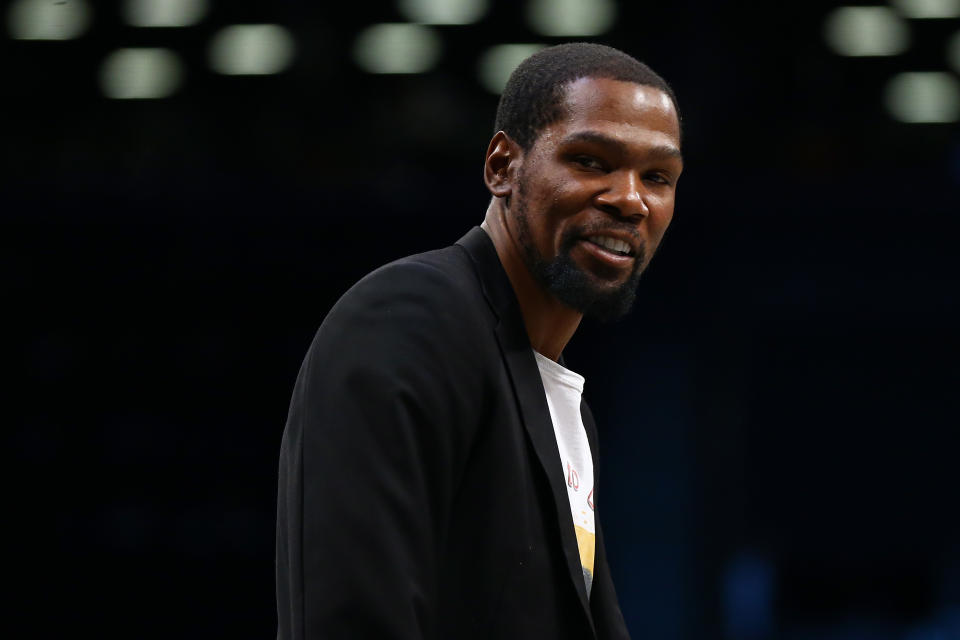Kevin Durant testing positive for coronavirus shows NBA’s unsteady footing
The coronavirus, unpredictable and fast-moving, has eliminated all of our preconceived notions in the span of days or even hours.
Thinking the NBA would be immune to real-life consequences flew out the window when Rudy Gobert came down with the virus, and if we thought the chosen ones would be above the fray, Kevin Durant, an inactive, top-15 all-time player, said Tuesday he had tested positive for it as well.
This is just beginning.
The league has to constantly recalibrate its thoughts and expectations quicker than the speed of news spreading, and it is simply unable to get in front of things.
It’s impossible to expect commissioner Adam Silver, and a gang of smart advisers and renowned medical professionals to accelerate their tactics about a silent opponent, yet the daily conference calls and email chains persist with the goal of somehow restarting basketball and finishing out the season.
High-ranking NBA officials told Yahoo Sports there are contingency plans upon contingency plans, because even through all the altruism of teams paying players and employees in the interim, the owners are running a business and would like to get back to business as quickly as possible.
Albeit, not business as usual.
As the visuals of people in some cities not taking the coronavirus pandemic as seriously as possible increase and the numbers of those affected rising by the minute, does all that set the NBA back further?

Evaluating risk with what’s at stake is an intersection the league sits at, a dangerous game of Double Dutch nobody is sure when to jump in at. The plan of testing players when some ordinary citizens are being neglected and, in a few cases, suffering dire consequences isn’t a great look.
But the eyes of the public being focused on healthy, noticeable NBA faces who test positive for the coronavirus carries currency that’s immeasurable in the long run. The NBA unwillingly and unknowingly became a leader of sorts when it was touched by the virus. Even though there are plenty who are cavalier still, many saw it hit their favorite sport and it hit home — making it as real as if it touched a family member or close friend.
As long as COVID-19 is in the public, it presents a risk to the league.
The 30-day hiatus buys the league some time — to fight this on its own front, to watch how this develops domestically, to pray there’s a vaccine that can be discovered and distributed to those vulnerable.
With that, there’s hope the league can restart in some form before July — if the changing season aids in halting the virus and mitigates the risk enough for the league to put players back on the floor, employees back in buildings and fans back in seats.
The goalposts are invisible and sometimes moving. Where’s the line between bringing players back to gyms and getting them back to playing shape, let alone prepared for the intensity of the playoffs?
Will players be tested regularly if the virus is still at a scary number for the community but not the sports world? With the window of the virus and the suggested 14-day quarantine, the league could conceivably head toward restarting and then have a player test positive, forcing the process back to Square One.
How will that be received by the players? And the public? Several teams have released statements about its testing, revealing that their players haven’t tested positive for COVID-19, but that isn’t absolute, considering how contagious it is.
There’s far more to discover before anyone can get a true handle on this. Durant wasn’t on the floor against Gobert or Donovan Mitchell this season. Hell, there’s no way to know how Durant or his Brooklyn Nets teammates even came down with the virus.
Because it moves silently, it feels random and non-discriminating, and until Americans fully embrace the dangers of this, it’ll be difficult for the NBA to project or estimate when it can return to normal or establish a temporary normal.
Shorter playoff series are being discussed when things do resume, but according to a high-ranking NBA official that’s “not ideal.”
Getting comfortable with being uncomfortable is the land the NBA inhabits, with no way to be anything but proactively reactionary as the coronavirus moves at its own pace through the United States.
The NBA has to be pragmatic, realistic and slightly creative if it wants to save the season while simultaneously putting on a good product that preserves the competitive standards it’s set forth.
It’s tough to find that perfect sweet spot of being fair to players, and appeasing the TV partners and fans while keeping some thread of history in a game that’s headed toward its 75th anniversary in two years.
Because nobody will be happy, the best the NBA can be is flexible.
More from Yahoo Sports:


